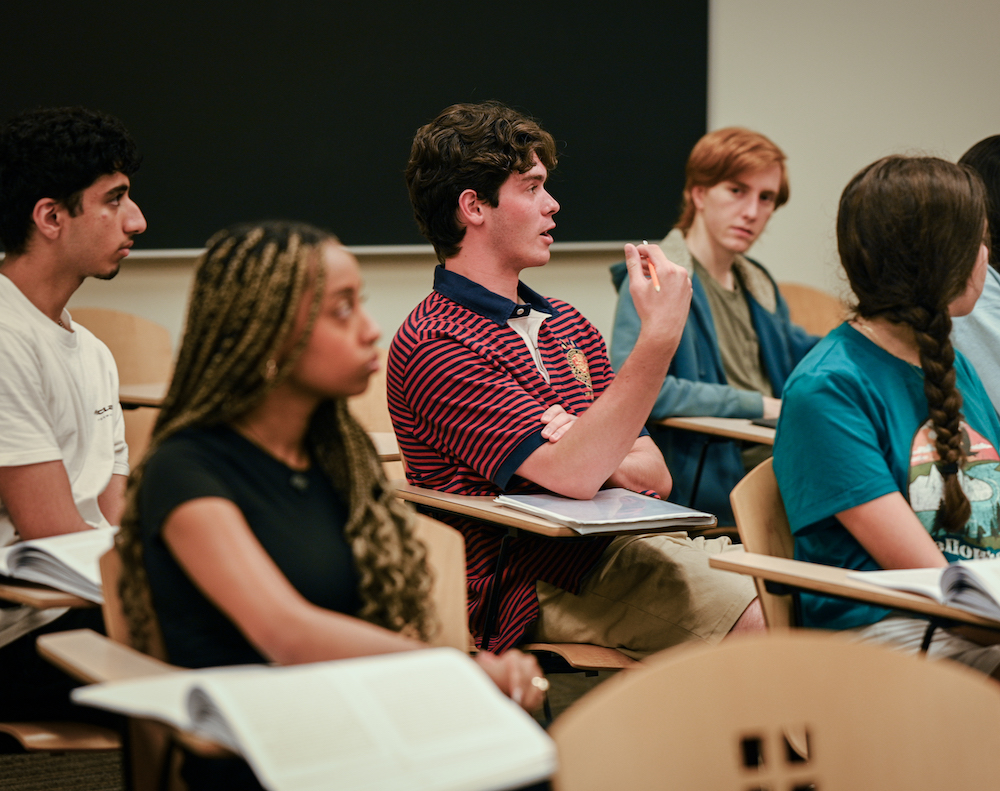Featured Courses
 The College of Arts and Science offers courses that tackle some of the biggest and most pressing issues of our time. With more than 600 courses to choose from each semester, you can dig into any topic, theme, or issue you’re interested in, learning to challenge your perspectives and approaches in new and unexpected ways. Explore some of these innovative courses, listed below.
The College of Arts and Science offers courses that tackle some of the biggest and most pressing issues of our time. With more than 600 courses to choose from each semester, you can dig into any topic, theme, or issue you’re interested in, learning to challenge your perspectives and approaches in new and unexpected ways. Explore some of these innovative courses, listed below.
Spring 2026 Featured Courses
Instructor: Keivan Stassun
The discovery of planets circling other stars is one of the most important breakthroughs in astronomy over the past 30 years—it has opened a new window on the universe and raised the possibility of life beyond our solar system. This course explores the science of extrasolar planets—thier discovery, composition, and ongoing impact on astronomical exploration and research.
Instructor: David Michelson
After two millennia, the Christian religion has more than 2 billion adherents spread around the globe. This course investigates the origins and growth of Christianity during its first thousand years, from the Eastern Mediterranean to the Roman and Persian Empires, medieval Asia, Africa, and Europe. Students will have the opportunity to study primary sources (in translation) in Greek, Latin, Syriac, and other languages. No prior knowledge of Christianity or anicent history is required.
Instructor: Paul Durst
Every good supervillain needs an evil scheme. While such schemes may seem like pure fantasy, they are often rooted in solid scientific principles. In this course, we will explore scientific concepts and technologies exploited by supervillains such as lasers, mind control, and genetic engineering. We will reveal how many of these fictional schemes have real-world correlates that pose existential threats to humanity, and we will grapple with how we can summon our inner superhero to tackle these challenges.
Instructor: Stephen Ornes
Is medicine, engineering, public health, or science in your future? One thing is certain: you're going to need to share complex ideas with all kinds of people, such as patients, colleagues, clients, collaborators, and potential employers. Writing about science and medicine teaches you to communicate tough topics to a broad audience in a way that's both personal and accessible. This critical skill is in high demand for tomorrow's doctors,computer scientists, engineers, writers, and researchers.
Instructor: Alex Morales
From environmental disasters and technological failures to medical controversies, students will analyze how governments, corporations, and other institutions respond to high-stakes events through crisis communication. Using case studies such as oil spills, nuclear accidents, public health emergencies, and product recalls, students wil explore how narratives are constructed, trust is negotiated, and accountability is framed.
Instructor: Akshya Saxena
How does a language disappear and what do we lose with it? With thousands of languages expected to vanish just in our lifetime, the stakes are both global and personal. Through literature, this course introduces you to the world’s multilingual diversity. Understanding the precarity of languages means better understanding the precarity of people—and developing the creativity and knowledge both to help and to interact at social, professional, and personal levels.
Instructor: Scott Juengel
Perhaps no family of writers have done more to construct our modern conceptions of passion and compulsion as the Brontë sisters. Although each died young, Emily, Charlotte, and Anne Brontë transformed their strange and isolated adolescence into unsettling meditations on family, gender, selfhood, human identity, and the mysteries of modern life. This course will hone your analytical and writing skills, while giving you the chance to read some of the most haunting novels of passion and compulsion ever written in English.
Instructor: Huan He
From digital games to AI to virtual reality, new media technologies are rapidly transforming human societies. Through literature and new media, we will explore the social and ethical concerns of technological innovation, specifically as it pertains to race and identity.
Instructor: Jack Crawford
In its breadth and geographic scope, this course gives students an ideal primer for engaging with global contemporary art. Students will learn to think comparatively across cultural traditions and will directly engage with recent efforts to de-colonize the discipline of art history.
Instructor: Tracy Miller
In this course, students will hone their awareness of the power of the built environment. They will learn how cities, temples, and landscapes built during China's imperial period (221 BCE-1912 CE) were designed to protect, impress, and tap into the energy of the cosmos to enhance the prosperity of their patrons. Students will broaden their understanding of how different architectural design strategies can be used to accomplish a variety of goals, from practical to spiritual.
Instructor: Abby Holecamp
How did Russia become the country it is today—stretching across 11 time zones and shaped by shifting borders, diverse peoples, and evolving identities? In this course, we will trace its story from the origins of Rus’ through the imperial era to the revolutions of 1917, building a foundation for questioning the stereotypes and assumptions that still surround Russia’s history and culture.
Instructor: T. McGinn
In a polarized society, how do you convince others of the rightness of your point of view in a civil and effective manner? We answer this question by examining the history of courtroom rhetoric in ancient Athens and Rome, in order to evaluate and apply its techniques. Through the course, students will learn how to construct an efficacious legal argument.
Instructor: T. McGinn
There is perhaps no better means to understand a society’s core values than through studying its criminal justice system. This course explores various aspects of delict and criminal law in ancient Athens and Rome, including affront, theft, extortion, treason, violence, sex crimes, and homicide, as well as the operation of the criminal court system.
Instructor: Rebecca Epstein-Levi
This course studies sexual ethics in Judaism, including why ancient texts are raunchier than you think, what being part of a religious minority and being part of a sexual minority have to do with each other, and a range of ways Jews have responded to questions about sex and the right and wrong ways to be good, just, and considerate sexual actors.
Instructor: Earl Fitz
The works of Machado de Assis were way ahead of his time. The themes in his pioneering, unique, and humorous writing are widely relevant to the modern world. He is regarded as Latin America’s greatest novelist of the late 19th and early 20th centuries. In this course, which is in English, we will read and discuss his three masterpieces: The Posthumous Memoirs of Bras Cubas, Quincas Borba, and Dom Casmurro.
Instructor: Adeana McNicholl
This course helps students to better understand and navigate the role of religion in public life today. Students will learn transferable skills in oral history, ethnographic observation, data analysis, and historical and literary analysis. We explore how religion intersects with a wide array of majors and fields, such as law, education, healthcare, business, and public service. Throughout the course, students will cultivate skills in communication, cultural literacy, and ethical reasoning, equipping them to thoughtfully engage in a diverse world.
Instructor: Abby Holecamp
What did Communism look like in everyday life? In this course, we’ll watch and analyze films from 1945–1989 that bring to life the police state, the Cold War, dissent, gender roles, health care, and daily experience in Eastern Europe and the Soviet Union. Students will have a vivid perspective into how Communism was lived, remembered, and contested.
Instructor: Denis Zhernokleyev
Dostoevsky’s The Brothers Karamazov is a landmark of world literature. Together we will explore its searching questions about human nature, morality, and faith, while also discovering what it reveals about Russian culture and history.
Instructor: Lori Catanzaro
This course includes a journey through the current economies of all the Spanish-speaking countries, with an emphasis on the impact of Latinos on the U.S. economy. Students learn about management, marketing, operations, supply chain, finance, human resources, banking, and real estate. By producing case studies, company profiles, and country briefs, students gain valuable research and presentation skills, and create a business to present to potential investors.
Instructor: Lori Catanzaro
Created for those planning a career in health care, this service-learning based course brings the classrom to life. Students do service work as medical interpreters or shadowing bilingual providers in Nashville health clinics serving the local Latino population. Focusing on health challenages and chronic illnesses, we look at shifting current social, economic, and policy issues, and cultural elements impacting how patients may perceive illness, seek treatment and follow up in their health care journey.
Instructor: Liz Haynes
This course explores a unique intersection of two different topics: how the entertainment industry contributes to the climate crisis. The collaborative and discussion-based class combines the science needed to talk about and understand the climate crisis with entertainment's role and commentary. The course is taught through the lens of hope because we will stop fighting for a better world if we don't believe it is possible!
Instructor: Kristyl Tift
In this class, every student is a star! Students have the chance to learn and practice film acting from an instructor who works professionally in film and television. Every student is given the opportunity to engage in scenework that excites, challenges, and encourages them to embrace the camera with confidence, technique, and style—and even develop thier self-taping audition skills.
